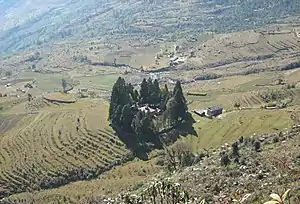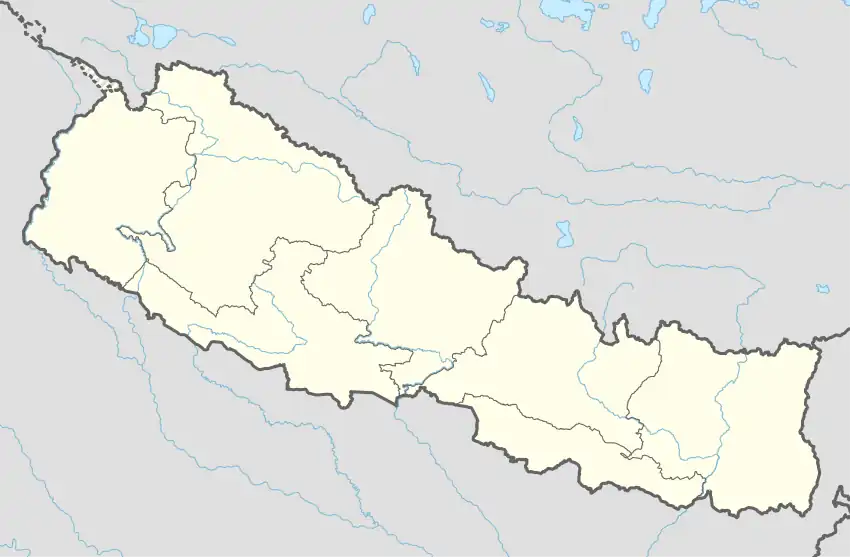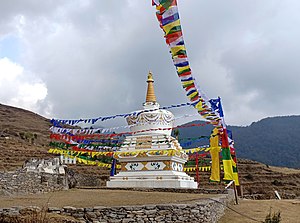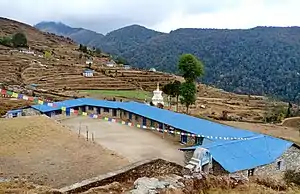Khiraule
खिरौले | |
|---|---|
 Picture of Khiraule Village and Khiraule Monastery (encircled by pine trees) captured on 6 December 2007 | |
 Khiraule Location in Province No. 1  Khiraule Khiraule (Nepal) | |
| Coordinates: 27°32′30″N 86°48′57″E / 27.54167°N 86.81583°E | |
| Country | |
| Province | Province No. 1 |
| Zone | Sagarmatha Zone |
| District | Solukhumbu District |
| Rural municipality | Mahakulung |
| Elevation | 2,400 m (7,900 ft) |
| Time zone | UTC+5:45 (Nepal Time) |
| Postal code | 56000 |
| Area code | 038 |
Khiraule (Nepali: खिरौले) is a Sherpa village located in Solukhumbu District Province No. 1, part of northeastern Nepal. It is 50.0 km south of Mt. Everest and 148 km east of Kathmandu at an elevation of 2,400 m. The village has an area of six square kilometres, almost half of which is covered in forest. Khiraule used to be classified as a village of Ward no. 9 of Bung[1] Village Development Committee, but after the dissolution of the committees[2] and establishment of gaunpalikas,[3] it was reclassified as one of the villages of Ward no. 1 of Mahakulung Rural Municipality.[4]
Religious Sites
Monastery
There is a monastery in Khiraule which is officially registered as Ngonga Thyakchhyok Chhyoling Monastery. It is also known as Khiraule Monastery[5] and Chambaling Monastery.[6]
Stupa (Chorten)

A 45 foot tall stupa, Chyang Chub Chorten (Nepali: बोधि चैत्य), was built in Khiraule in 2019 and consecrated in 2020.[7][8] The stupa, which is also known as the Enlightenment Stupa, is one of the eight types of Tibetan stupas that symbolize important events in the life of Gautama Buddha.[9] The stupa built in Khiraule symbolizes Buddha's enlightenment under the Bodhi Tree in Bodh Gaya.
School

Khiraule Lower Secondary School[10][11] is the first and only school in Khiraule. It was officially established in 2049 B.S. Many improvements to the school's infrastructure were carried out in recent years with the help of private contributors.[12]
Hydropower
Surke Khola Micro Hydropower is the first hydropower plant in Khiraule. The plant was completed and started operation in 2019.[13]
Medical Center (Clinic)
Khiraule Community Heath Unit was established in 2016.
References
- ↑ "District: Solukhumbu. List of Settlements" (PDF). Index of Geographical names of Nepal. National Geographic Information Infrastructure Programme. www.ngiip.gov.np. Archived from the original (PDF) on 2016-01-09. Retrieved 2015-09-08.
- ↑ "Government announces dissolution of VDCs, birth of village councils". Online Khabar. Archived from the original on 12 April 2017. Retrieved 12 April 2017.
- ↑ "Gaunpalikas to be called rural municipalities". No. 15 March 2017. Himalayan Times. The Himalayan. Retrieved 12 April 2017.
- ↑ "आ.व ०७५।०७६ को लागि वडा नं १ मा स्विकृत योजनाहरु । | महाकुलुङ गाउँपालिका, गाउँ कार्यपालिकाको कार्यालय". mahakulungmun.gov.np. Retrieved 2020-09-01.
- ↑ "माहाकुलुङ १ स्थित खिरौले गुम्बा | महाकुलुङ गाउँपालिका, गाउँ कार्यपालिकाको कार्यालय". mahakulungmun.gov.np. Retrieved 2020-09-04.
- ↑ "Bung, Nepal", Wikipedia, 2020-09-01, retrieved 2020-09-03
- ↑ rinpoche (2020-02-06). "सोलखुम्बुको महाकुलुङमा चैत्य स्थापना, धार्मिक पर्यटनको वृद्धि हुने विश्वास". Nepal Buddhist News (in Nepali). Retrieved 2020-09-02.
- ↑ शेर्पा, छेटु. "महाकुलुङमा ४५ फिट अग्लो बोधिचैत्य निर्माण". NepalNews. Retrieved 2020-09-02.
- ↑ "Eight types of Stupas". www.pagoda.lv. Retrieved 2020-09-02.
- ↑ "खिरौले निम्न माध्यमिक विद्यालय | महाकुलुङ गाउँपालिका, गाउँ कार्यपालिकाको कार्यालय". mahakulungmun.gov.np. Retrieved 2020-09-04.
- ↑ "Integrated Educational Management System (IEMS)" (PDF).
- ↑ "Khiraule Education and Health Project". Rotary International District 1190. 2013-10-06. Retrieved 2020-09-17.
- ↑ "EcoHimal Nepal". ecohimal.org.np. Retrieved 2020-09-02.